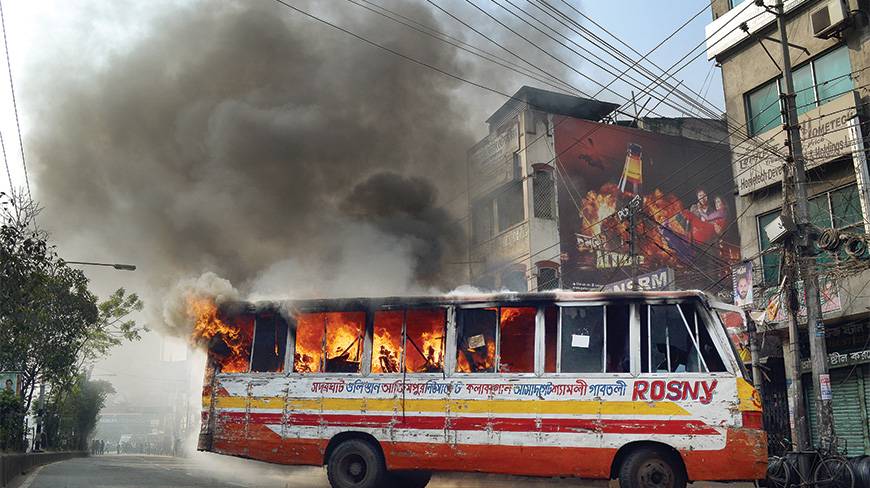Economic danger signs start to show
The economic damages caused by the current political unrest starts coming out on the surface as most key macroeconomic indicators are in the red.
The indicators show economy-wide phenomena such as changes in unemployment, national income, rate of growth, gross domestic product, inflation and price levels.
The country’s investment, labor market, revenue income, inflation and growth in many other areas have started declining, casting a gloomier picture on economic growth prospects estimated by the global financial agencies earlier.
At present, the exports and imports are in positive territory yet, but set to fall soon as orders already showing negative trend, exporters and importers say.
Now it is easy to gauge the situation stemming from the long spell of political unrest, which is grave, and the economic growth might suffer so badly that would be unprecedented since in 1971, analysts say.
Bangladesh already lost 71 days to shutdowns and blockades, which is up from an average of 46 days a year since 1991, according to a study released by the Centre for Policy Dialogue.
The BNP-led opposition alliance has enforced non-stop blockades demanding restoration of caretaker government system to oversee national polls.
As soon as the polls are over yesterday, it further intensified the protest through announcing a 48-hour hartal besides the non-stop blockade.
Private borrowing from the banking sector dropped to 11%, much lower than the same period a year earlier when it was 20%, according to Bangladesh Bank.
Remittance, the country’s second biggest source of earnings, took a jolt for the first time in more than a decade as the central bank figure shows that in 2013, expatriates remitted US$13.84bn, a drop of 2.39% over 2012.
Bangladesh’s manpower export in 2013, compared to the previous year, decreased by over two lakh to little 4 lakh, according to the Bureau of Manpower, Employment and Training.
In the first four months of the current fiscal year, revenue income fell by Tk3,100 crore from targeted Tk33,400 crore, the National Revenue Board data show.
According to the Bangladesh Bureau of Statistics, inflation increased by 0.12 percentage points to 7.15% in November 2013, from 7.03% in the previous month of October.
During July-November period, the government spent Tk13,156 crore, which is only 20% of the Tk65,872 crore earmarked for the annual development programme, according to the Implementation, Monitoring and Evaluation Division of the planning ministry.
The overall export, though it rose by 18% in five months of the current fiscal year, are set to suffer as the buyers were slashing the export orders. The apparel industry accounts for almost 80% of the country’s total export earnings.
Global retailers canceled orders valued at $3.77m in December as the blockades disrupted shipments, according to Bangladesh Garment Manufacturers and Exporters Association.
“Orders for the fall season have dropped substantially because the global buyers are scarred of the prolonged political unrest,” Shahidullah Azim, BGMEA vice president, told the Dhaka Tribune earlier.
The country’s imports, however, increased by 9% to $14.54bn in the first five months of the current fiscal year compared to that of the previous year due mainly to rising import of food grains, Bangladesh Bank officials said.
Owning to higher import growth amid such an adverse investment climate, the central bank smells rat as it has recently asked banks and financial institutions to preserve data of clients in an effort to prevent money laundering.
“You need not to become a pundit to understand the situation,” said Ahsan H Mansur, executive director of Policy Research Institute.
He feared that the country’s GDP growth might go down below 5%. His estimation is much lower than the budgetary projection of 7.2% for the current fiscal year and close to the International Monetary Fund’s forecast of 5.5% and the World Bank’s 5.7%.
The BB has already revised it down and said growth is likely to see between 5.7% and 6%.
Ex-finance adviser to the caretaker government Mirza Azizul Islam said the situation might turn worse as strain relationship has already developed with America and European Countries – the country’s major export destination.
Economist MA Taslim said present political deadlock should be settled down immediately.
“If it lasts two or three months more, people will have no other means but to fight back to live.”
The country’s GDP could have registered 10% growth in next few years but, he said, the political instability has already destroyed the prospect.
Source: Dhaka Tribune











The way the ruling party boss and her trumpets blow it’s clear that they don’t bother even a little what happens to this wretched country and her people because why should they? From the latest newspaper reports we know that most of them have accumulated huge wealth abroad and if this sinking ship finally takes refuse under the fathomless ocean, they won’t care. Of course the opposition too has not much concern for the people either. Look how insensibly they call hartals and blockades. They have failed to restrain the ruling party from holding election but all the brunt is being borne by the common people. What kind of politics is this? And look at our ‘aam janata’. How complacent and patient they are! They appear to be helpless bullocks stuck in knee-deep mud, bearing with random whipping with limitless patience. Joi ho!!